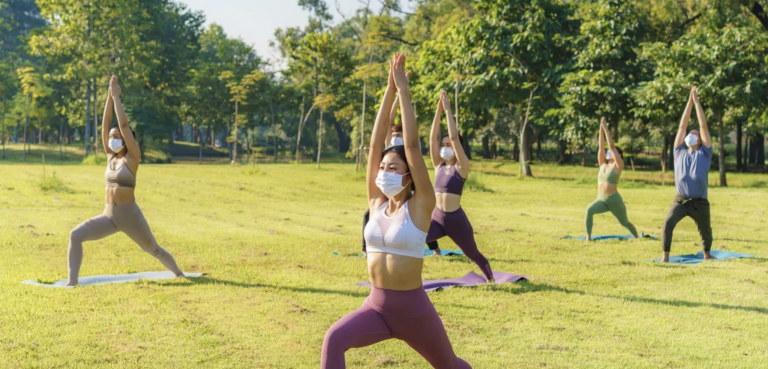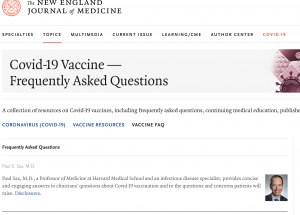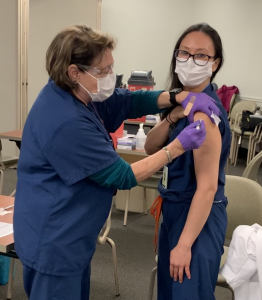The original article was posted on Yoga Journal – view here.
Spring is in the air, and after an unprecedented year, our communities are beginning to open back up. While we may be ready for new beginnings, we also acknowledge that the COVID-19 pandemic has left us reeling from the loss of health and connection. We know that attending an in-person yoga class can alleviate many of our stuck-in-a-rut maladies. But many of us have questions on how to do so safely.
Most yoga studios are taking enhanced cleaning precautions and ensuring that all mats stay 6 feet apart. Some allow practitioners to remove their masks once they are on their mats. But is that enough to keep ourselves and others safe during this ongoing pandemic?
The Centers for Disease Control and Prevention (CDC) recently published an analysis on the increased relative risk of transmission at group exercise facilities. They point out that high-intensity activities increase risk, but also specify that yoga might be a lower risk, because of its reduced intensity. Nevertheless, they recommend that everyone, even people who are fully vaccinated, should wear masks at all times while in the facility—no matter if you’re on or off the mat.
While it may feel awkward wearing a mask while practicing Ujjayi breathing, the right mask can make all the difference. Here, we offer tips for how to make mask-wearing more comfortable, plus our six favorites to don during your practice.
Tips for mask wearing
The best face mask is one that allows you to follow the CDC’s recommended “consistent and correct” mask usage. So, if we are consistent in wearing our masks, what does correct mean? Correct mask usage means:
- It completely covering the nose and mouth
- It offers a snug fit without gaps around the face
- The wearer handles it only by the ear loops or straps, not by the surface of the mask.
A good fit is important both so your droplets don’t escape around a poorly fitted mask, but also so you are not constantly fidgeting with it, and thus inadvertently touching your face.
The CDC also recommends trying your mask at home before wearing it out to ensure you can tolerate it for the intended activity, so don’t be shy about using the mask during your next online yoga class!
Selecting the right mask
When selecting the best face mask to wear during yoga, there are two important factors to consider: the mask structure and care.
Mask Structure
Per the CDC, the key is many layers (two or more) with high thread counts. Specifically, the CDC states that “multiple layers of cloth with higher thread counts have demonstratedsuperior performance.” Additionally, nose wires can be particularly helpful to hold the mask in place and reduce the risk of contamination from adjusting the mask.
Care
Choose a mask that is easily machine washable. This is important after prolonged wear and sweating because bacteria can become caught in the cloth of your mask. Over time, the mask can become a cesspool for bacterial growth—so make sure to wash it after each use.
Our picks for the best face masks for yoga
The all-around favorite: The Under Armour SportsMask
This mask is made with movement in mind, so it’ll stay in place while you practice your inversions and backbends. It’s made with polyurethane open-cell foam, which Under Armour states lets air through, allowing for safe ventilation while keeping your droplets to yourself. And if your yoga session happens to be outside, you have an added benefit—this mask is infused with UPF 50+ sun protection. $30, two for $50
For simplicity and function: Outdoor Research Mask Kit
If you want to check all the CDC’s boxes for cloth masks without making a fuss, this may be your answer. Outdoor Research’s mask has a double layer, which is important for catching droplets emitted from your own nose and mouth. An easily adjustable nose-bridge wire allows for a snug fit, thus minimizing air leakage that often clouds up glasses. It also has a filter pocket (and comes with a three-pack of removable filters) adding extra protection. And bonus: it’s easily machine washable and maintains its structure out of the dryer. $10
For hot yoga: The Nathan Run Safe Mask
Wearing a mask to protect others (and yourself) while practicing yoga is cool. But hot yogais, well, hot, which makes the idea of wearing a mask during class quite stifling. The Nathan Run Safe mask is made to sweat in and features a “Quick-Flip” function to allow for easy and efficient hydration, with minimal time to uncover your mouth for a sip of water. The mask also wraps around your head instead of your ears for secure placement and is made with quick-dry, machine-washable material. $14.99, on sale
For comfort and style: The Proper Cloth EveryDay Mask
Proper Cloth, a custom menswear brand in NYC, has poured its tailoring expertise into an elegantly designed mask for everyone. This mask is made from premium shirting fabrics sourced from Europe and Japan to create its inner and outer layers. This five-layered mask includes a three-layer polypropylene filter for the inner layers, which the CDC suggests may enhance droplet-filtering efficacy. $20, on sale
For paying it forward: Beyond Yoga In This Together Mask
Beyond Yoga, known for its comfy yoga apparel and clean designs, has made the natural transition to creating face masks to wear while practicing yoga. This mask is made with the same fabric as their clothes (read: soft, comfortable, and flexible) and comes in a variety of lovely designs. The straps can be fastened into ear loops or tied behind the head, allowing for easy convertibility and fit. But the best feature? When you purchase the two-pack, Beyond Yoga donates a mask to essential workers who need them. All you have to do is email [email protected] to request masks for your organization. That’s some Karma Yoga for you. $25 for two
The ideas offered in this article are for informational purposes only. They are not intended as medical advice, professional diagnoses, opinions, treatments, or medical services to you, or any other individual. It should not substitute for the advice of your physician or healthcare provider. If you have any concerns or questions about your health, you should always consult your physician directly.
Ingrid Yang, MD, JD, E-RYT-500, C-IAYT has been teaching yoga since 1999 and is a physician specializing in Physical Medicine and Rehabilitation. Her expert grasp of anatomy and human physiology bring a unique, thoughtful and joyful experience to the practice of yoga. Ingrid is also a certified yoga therapist under the International Association of Yoga Therapists (IAYT) and a Reiki master of the Usui tradition.




